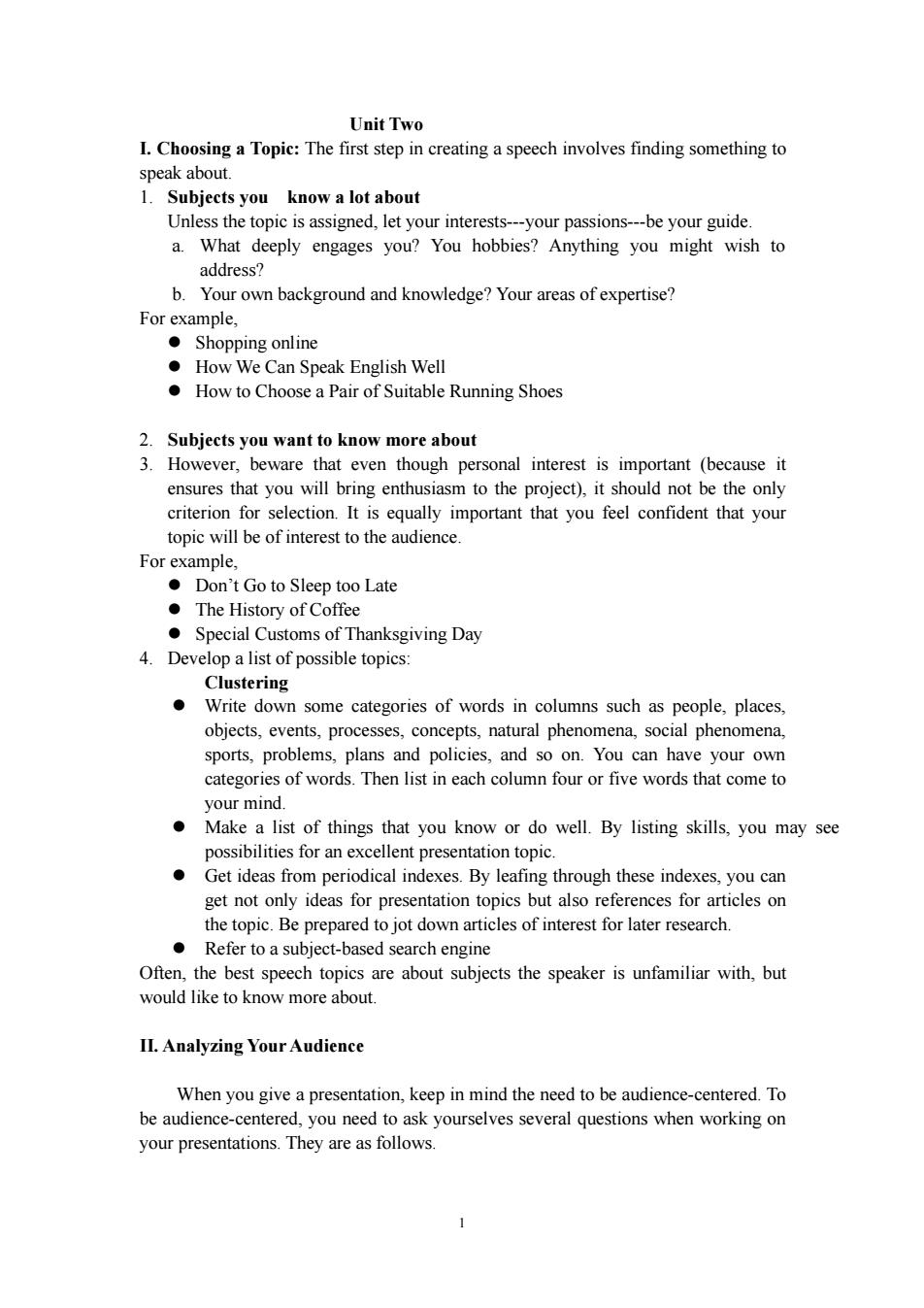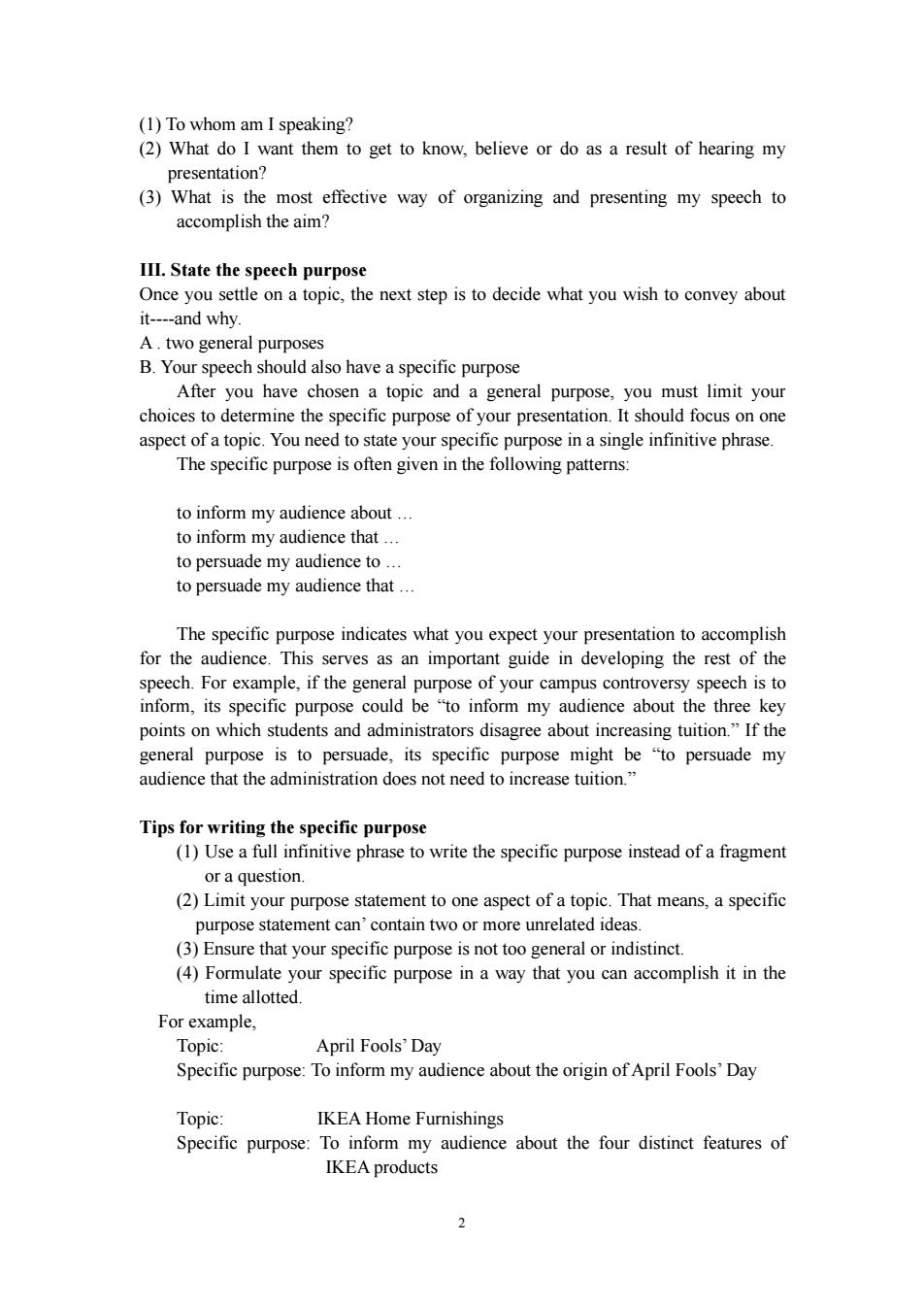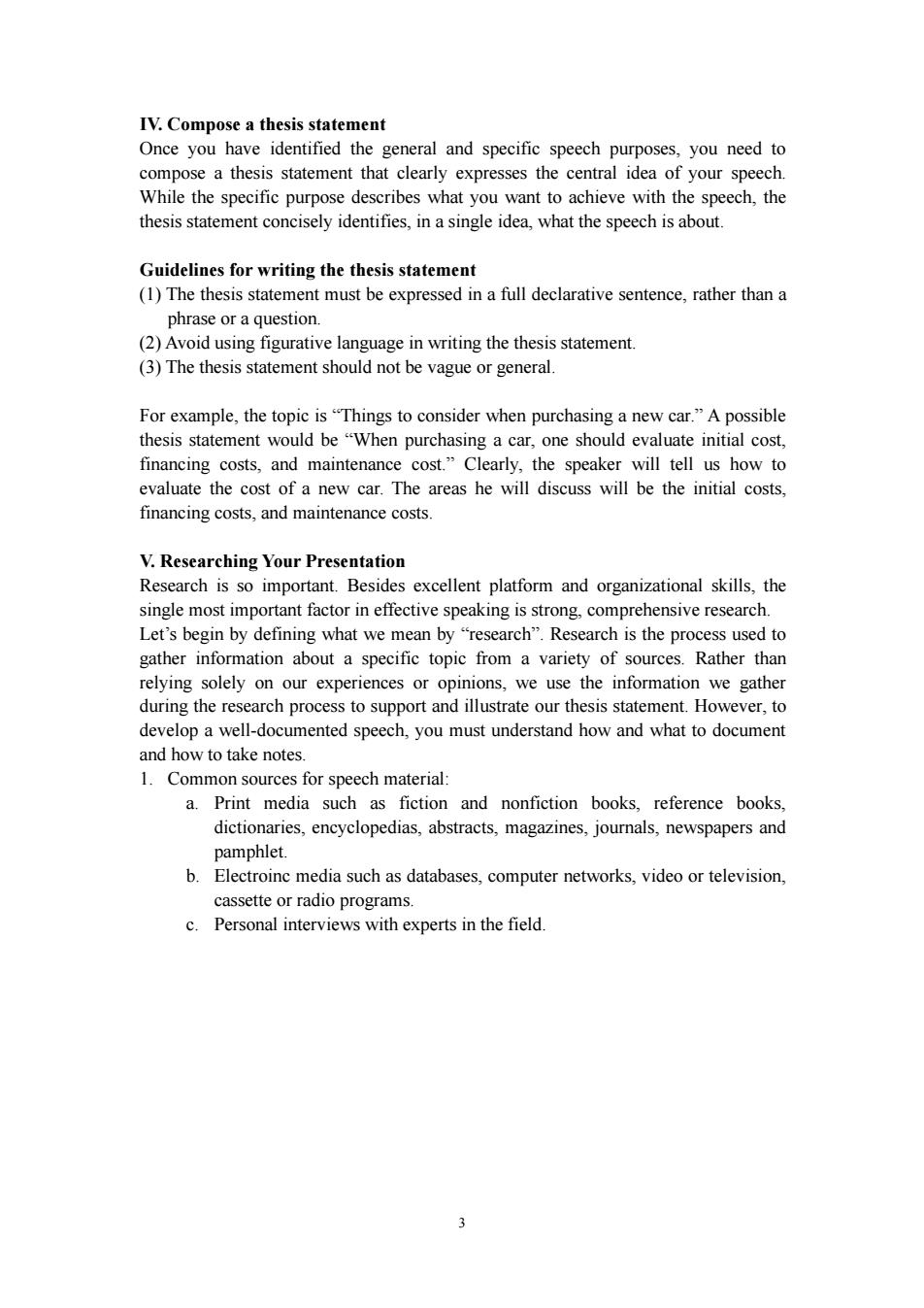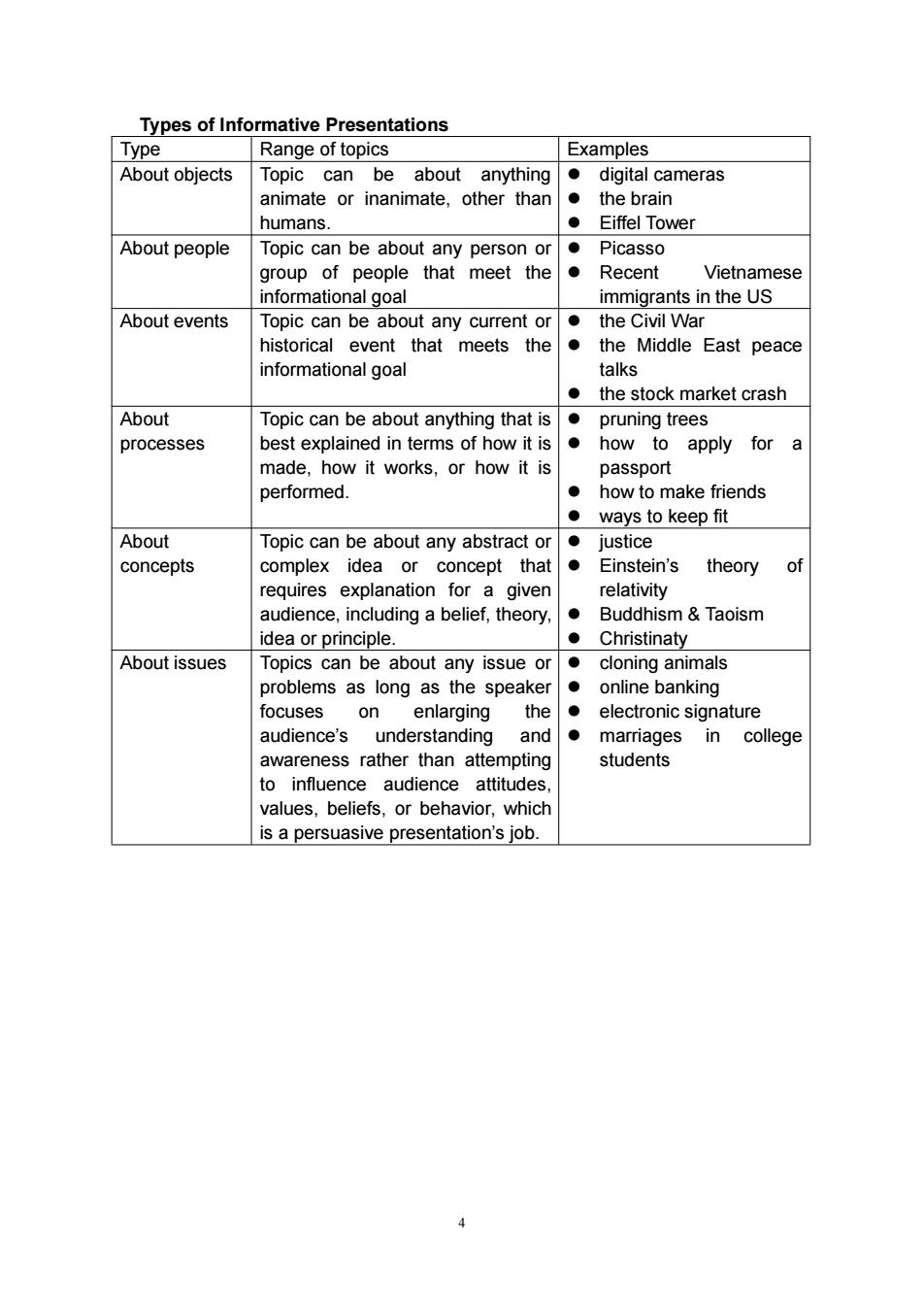
Unit Two I.Choosing a Topic:The first step in creating a speech involves finding something to speak about. 1.Subjects you know a lot about Unless the topic is assigned,let your interests---your passions---be your guide. a.What deeply engages you?You hobbies?Anything you might wish to address? b.Your own background and knowledge?Your areas of expertise? For example, ●Shopping online How We Can Speak English Well How to Choose a Pair of Suitable Running Shoes 2.Subjects you want to know more about 3.However,beware that even though personal interest is important (because it ensures that you will bring enthusiasm to the project),it should not be the only criterion for selection.It is equally important that you feel confident that your topic will be of interest to the audience. For example, Don't Go to Sleep too Late ●The History of Coffee Special Customs of Thanksgiving Day 4.Develop a list of possible topics: Clustering Write down some categories of words in columns such as people,places, objects,events,processes,concepts,natural phenomena,social phenomena, sports,problems,plans and policies,and so on.You can have your own categories of words.Then list in each column four or five words that come to your mind. Make a list of things that you know or do well.By listing skills,you may see possibilities for an excellent presentation topic. Get ideas from periodical indexes.By leafing through these indexes,you can get not only ideas for presentation topics but also references for articles on the topic.Be prepared to jot down articles of interest for later research. Refer to a subject-based search engine Often,the best speech topics are about subjects the speaker is unfamiliar with,but would like to know more about. II.Analyzing Your Audience When you give a presentation,keep in mind the need to be audience-centered.To be audience-centered,you need to ask yourselves several questions when working on your presentations.They are as follows
1 Unit Two I. Choosing a Topic: The first step in creating a speech involves finding something to speak about. 1. Subjects you know a lot about Unless the topic is assigned, let your interests---your passions---be your guide. a. What deeply engages you? You hobbies? Anything you might wish to address? b. Your own background and knowledge? Your areas of expertise? For example, Shopping online How We Can Speak English Well How to Choose a Pair of Suitable Running Shoes 2. Subjects you want to know more about 3. However, beware that even though personal interest is important (because it ensures that you will bring enthusiasm to the project), it should not be the only criterion for selection. It is equally important that you feel confident that your topic will be of interest to the audience. For example, Don’t Go to Sleep too Late The History of Coffee Special Customs of Thanksgiving Day 4. Develop a list of possible topics: Clustering Write down some categories of words in columns such as people, places, objects, events, processes, concepts, natural phenomena, social phenomena, sports, problems, plans and policies, and so on. You can have your own categories of words. Then list in each column four or five words that come to your mind. Make a list of things that you know or do well. By listing skills, you may see possibilities for an excellent presentation topic. Get ideas from periodical indexes. By leafing through these indexes, you can get not only ideas for presentation topics but also references for articles on the topic. Be prepared to jot down articles of interest for later research. Refer to a subject-based search engine Often, the best speech topics are about subjects the speaker is unfamiliar with, but would like to know more about. II. Analyzing Your Audience When you give a presentation, keep in mind the need to be audience-centered. To be audience-centered, you need to ask yourselves several questions when working on your presentations. They are as follows

(1)To whom am I speaking? (2)What do I want them to get to know,believe or do as a result of hearing my presentation? (3)What is the most effective way of organizing and presenting my speech to accomplish the aim? III.State the speech purpose Once you settle on a topic,the next step is to decide what you wish to convey about it----and why. A.two general purposes B.Your speech should also have a specific purpose After you have chosen a topic and a general purpose,you must limit your choices to determine the specific purpose of your presentation.It should focus on one aspect of a topic.You need to state your specific purpose in a single infinitive phrase. The specific purpose is often given in the following patterns: to inform my audience about... to inform my audience that... to persuade my audience to... to persuade my audience that... The specific purpose indicates what you expect your presentation to accomplish for the audience.This serves as an important guide in developing the rest of the speech.For example,if the general purpose of your campus controversy speech is to inform,its specific purpose could be "to inform my audience about the three key points on which students and administrators disagree about increasing tuition."If the general purpose is to persuade,its specific purpose might be "to persuade my audience that the administration does not need to increase tuition." Tips for writing the specific purpose (1)Use a full infinitive phrase to write the specific purpose instead of a fragment or a question. (2)Limit your purpose statement to one aspect of a topic.That means,a specific purpose statement can'contain two or more unrelated ideas. (3)Ensure that your specific purpose is not too general or indistinct. (4)Formulate your specific purpose in a way that you can accomplish it in the time allotted. For example, Topic: April Fools'Day Specific purpose:To inform my audience about the origin of April Fools'Day Topic: IKEA Home Furnishings Specific purpose:To inform my audience about the four distinct features of IKEA products 2
2 (1) To whom am I speaking? (2) What do I want them to get to know, believe or do as a result of hearing my presentation? (3) What is the most effective way of organizing and presenting my speech to accomplish the aim? III. State the speech purpose Once you settle on a topic, the next step is to decide what you wish to convey about it----and why. A . two general purposes B. Your speech should also have a specific purpose After you have chosen a topic and a general purpose, you must limit your choices to determine the specific purpose of your presentation. It should focus on one aspect of a topic. You need to state your specific purpose in a single infinitive phrase. The specific purpose is often given in the following patterns: to inform my audience about … to inform my audience that … to persuade my audience to … to persuade my audience that … The specific purpose indicates what you expect your presentation to accomplish for the audience. This serves as an important guide in developing the rest of the speech. For example, if the general purpose of your campus controversy speech is to inform, its specific purpose could be “to inform my audience about the three key points on which students and administrators disagree about increasing tuition.” If the general purpose is to persuade, its specific purpose might be “to persuade my audience that the administration does not need to increase tuition.” Tips for writing the specific purpose (1) Use a full infinitive phrase to write the specific purpose instead of a fragment or a question. (2) Limit your purpose statement to one aspect of a topic. That means, a specific purpose statement can’ contain two or more unrelated ideas. (3) Ensure that your specific purpose is not too general or indistinct. (4) Formulate your specific purpose in a way that you can accomplish it in the time allotted. For example, Topic: April Fools’ Day Specific purpose: To inform my audience about the origin of April Fools’ Day Topic: IKEA Home Furnishings Specific purpose: To inform my audience about the four distinct features of IKEA products

IV.Compose a thesis statement Once you have identified the general and specific speech purposes,you need to compose a thesis statement that clearly expresses the central idea of your speech. While the specific purpose describes what you want to achieve with the speech,the thesis statement concisely identifies,in a single idea,what the speech is about. Guidelines for writing the thesis statement (1)The thesis statement must be expressed in a full declarative sentence,rather than a phrase or a question. (2)Avoid using figurative language in writing the thesis statement. (3)The thesis statement should not be vague or general. For example,the topic is "Things to consider when purchasing a new car."A possible thesis statement would be "When purchasing a car,one should evaluate initial cost, financing costs,and maintenance cost."Clearly,the speaker will tell us how to evaluate the cost of a new car.The areas he will discuss will be the initial costs, financing costs,and maintenance costs. V.Researching Your Presentation Research is so important.Besides excellent platform and organizational skills,the single most important factor in effective speaking is strong,comprehensive research. Let's begin by defining what we mean by "research".Research is the process used to gather information about a specific topic from a variety of sources.Rather than relying solely on our experiences or opinions,we use the information we gather during the research process to support and illustrate our thesis statement.However,to develop a well-documented speech,you must understand how and what to document and how to take notes. 1.Common sources for speech material: a.Print media such as fiction and nonfiction books,reference books, dictionaries,encyclopedias,abstracts,magazines,journals,newspapers and pamphlet. b.Electroinc media such as databases,computer networks,video or television, cassette or radio programs. c.Personal interviews with experts in the field
3 IV. Compose a thesis statement Once you have identified the general and specific speech purposes, you need to compose a thesis statement that clearly expresses the central idea of your speech. While the specific purpose describes what you want to achieve with the speech, the thesis statement concisely identifies, in a single idea, what the speech is about. Guidelines for writing the thesis statement (1) The thesis statement must be expressed in a full declarative sentence, rather than a phrase or a question. (2) Avoid using figurative language in writing the thesis statement. (3) The thesis statement should not be vague or general. For example, the topic is “Things to consider when purchasing a new car.” A possible thesis statement would be “When purchasing a car, one should evaluate initial cost, financing costs, and maintenance cost.” Clearly, the speaker will tell us how to evaluate the cost of a new car. The areas he will discuss will be the initial costs, financing costs, and maintenance costs. V. Researching Your Presentation Research is so important. Besides excellent platform and organizational skills, the single most important factor in effective speaking is strong, comprehensive research. Let’s begin by defining what we mean by “research”. Research is the process used to gather information about a specific topic from a variety of sources. Rather than relying solely on our experiences or opinions, we use the information we gather during the research process to support and illustrate our thesis statement. However, to develop a well-documented speech, you must understand how and what to document and how to take notes. 1. Common sources for speech material: a. Print media such as fiction and nonfiction books, reference books, dictionaries, encyclopedias, abstracts, magazines, journals, newspapers and pamphlet. b. Electroinc media such as databases, computer networks, video or television, cassette or radio programs. c. Personal interviews with experts in the field

Types of Informative Presentations Type Range of topics Examples About objects Topic can be about anything ●digital cameras animate or inanimate,other than ● the brain humans. ●Eiffel Tower About people Topic can be about any person or ● Picasso group of people that meet the Recent Vietnamese informational goal immigrants in the US About events Topic can be about any current or the Civil War historical event that meets thethe Middle East peace informational goal talks the stock market crash About Topic can be about anything that is pruning trees processes best explained in terms of how it is how to apply for a made,how it works,or how it is passport performed. ● how to make friends ●ways to keep fit About Topic can be about any abstract or justice concepts complex idea or concept that ● Einstein's theory of requires explanation for a given relativity audience,including a belief,theory, ● Buddhism Taoism idea or principle. ●Christinaty About issues Topics can be about any issue or cloning animals problems as long as the speaker ● online banking focuses on enlarging the ● electronic signature audience's understanding and marriages in college awareness rather than attempting students to influence audience attitudes, values,beliefs,or behavior,which is a persuasive presentation's job
4 Types of Informative Presentations Type Range of topics Examples About objects Topic can be about anything animate or inanimate, other than humans. digital cameras the brain Eiffel Tower About people Topic can be about any person or group of people that meet the informational goal Picasso Recent Vietnamese immigrants in the US About events Topic can be about any current or historical event that meets the informational goal the Civil War the Middle East peace talks the stock market crash About processes Topic can be about anything that is best explained in terms of how it is made, how it works, or how it is performed. pruning trees how to apply for a passport how to make friends ways to keep fit About concepts Topic can be about any abstract or complex idea or concept that requires explanation for a given audience, including a belief, theory, idea or principle. justice Einstein’s theory of relativity Buddhism & Taoism Christinaty About issues Topics can be about any issue or problems as long as the speaker focuses on enlarging the audience’s understanding and awareness rather than attempting to influence audience attitudes, values, beliefs, or behavior, which is a persuasive presentation’s job. cloning animals online banking electronic signature marriages in college students